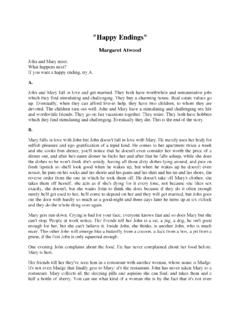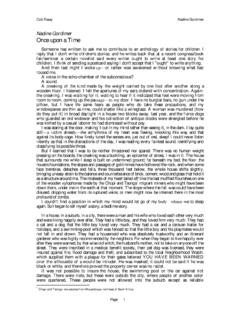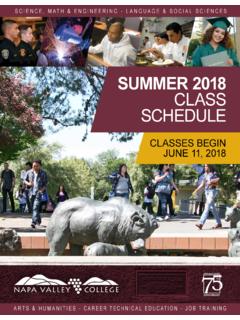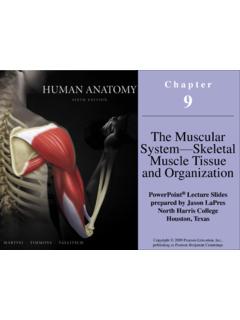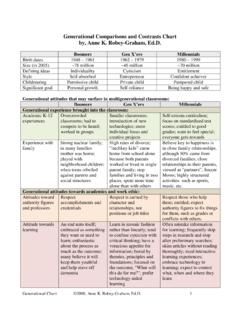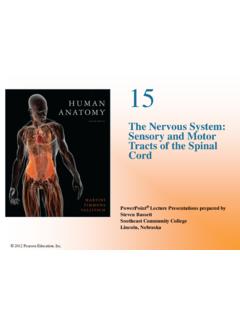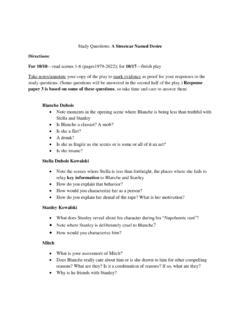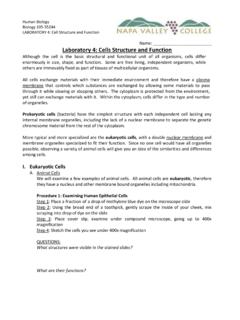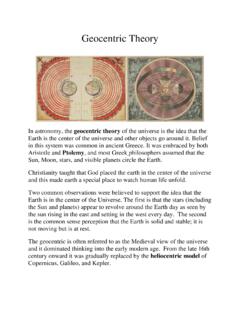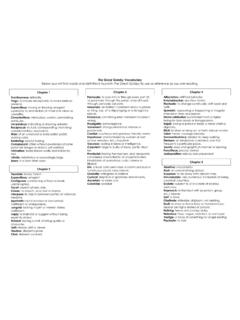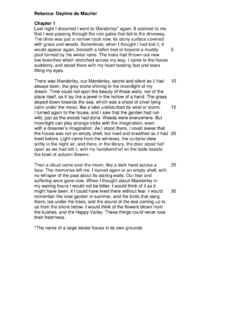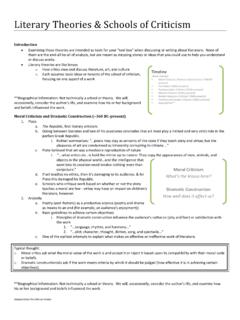Transcription of Excerpt from the Interesting ... - Napa Valley College
1 1. Excerpt from the Interesting Narrative of the Life of Olaudah Equiano Questions to think about: 1. Using examples from Equiano's autobiography, describe the treatment of slaves during the Middle Passage. 2. What were Equiano's greatest fears during the Middle Passage? 3. Equiano's autobiography was written in protest against the horrors of slavery. How does he attempt to convince the reader of the unjustness of slavery? (This question requires some thought: there are both obvious and not-so-obvious answers to this question.). Excerpt from Olaudah Equiano, The Interesting Narrative of the Life of Oludah Equiano (1789).1 Olaudah Equiano (pronounced o-lah-oo-day ek-wee-ah-no) was born in a Nigerian village in At the age of eleven he was kidnapped by African slave traders and taken to the coast, where he was sold to a European slave trader headed to the Caribbean. Equiano spent the next ten years as a slave in the Caribbean and the English colonies.
2 One of Equiano's masters was a British naval captain with whom Equiano travelled the world. Equiano was later sold to a Quaker merchant for whom he worked as a book-keeper on a slave ship. On the side Equiano began transporting goods between the Caribbean and the English colonies on the slave-ship. Equiano eventually saved up enough money to buy his freedom in 1766. He initially continued to work on a slave ship. In 1774 one of Equiano's friends, a slave named John Annis, was tortured to death by his master after seeking his freedom. Equiano had a near mental breakdown. He contemplated suicide, but a religious experience prompted him to convert to Christianity and he dedicated the rest of his life to the young abolition movement. He settled in England and married a white Englishwoman, dying in 1797. Many abolitionists, especially at this early date, thought slavery was immoral, but that did not mean that they necessarily viewed people of African descent as their equals.
3 Equiano's autobiography is in part a reaction against this type of prejudice. Here Equiano recounts the Middle Passage, the trip that slaves made from Africa to the Western Hemisphere: 1. Olaudah Equiano, The Interesting Narrative of the Life of Olaudah Equiano Written by Himself, ed. by Robert J. Allison (Boston, 1995), pp. 54 8. 2. There is some debate over where Equiano was born. For more information see (the website of a British academic who has studied Equiano). Another good webpage is (created by Western Michigan University). HIST 120 Dr. Schaffer 2. When I looked round the ship too and saw a large furnace or copper-boiling, and a multitude of black people of every description chained together, every one of their countenances expressing dejection and sorrow, I no longer doubted of my fate; and, quite overpowered with horror and anguish, I fell motionless on the deck and fainted. When I recovered a little I found some black people about me, who I.
4 Believed were some of those who brought me on board, and had been receiving their pay; they talked to me in order to cheer me, but all in vain. I asked them if we were not to be eaten by those white men with horrible looks, red faces, and loose hair. They told me I was not: and one of the crew brought me a small portion of spirituous liquor in a wine glass; but, being afraid of him, I would not take it out of his hand. One of the blacks therefore took it from him and gave it to me, and I took a little down my palate, which, instead of reviving me, as they thought it would, threw me into the greatest consternation at the strange feeling it produced, having never tasted any such liquor before. Soon after this the blacks who brought me on board went off, and left me abandoned to despair I now saw myself deprived of all chance of returning to my native country, or even the least glimpse of hope of gaining the shore, which I. now considered as friendly; and I even wished for my former slavery in preference to my present situation, which was filled with horrors of every kind, still heightened by my ignorance of what I was to undergo.
5 I was not long suffered to indulge my grief; I was soon put down under the decks, and there I. received such a salutation in my nostrils as I had never experienced in my life: so that, with the loathsomeness of the stench, and crying together, I became so sick and low that I was not able to eat, nor had I the least desire to taste any thing. I now wished for the last friend, death, to relieve me; but soon, to my grief, two of the white men offered me eatables; and, on my refusing to eat, one of them held me fast by the hands, and laid me across I think the windlass, and tied my feet, while the other flogged me severely. I had never experienced any thing of this kind before . In a little time after, amongst the poor chained men, I found some of my own nation, which in a small degree gave ease to my mind. I inquired of these what was to be done with us; they gave me to understand we were to be carried to these white people's country to work for them.
6 I then was a little revived, and thought, if it were no worse than working, my situation was not so desperate: but still I. feared I should be put to death, the white people looked and acted, as I thought, in so savage a manner;. for I had never seen among any people such instances of brutal cruelty; and this not only shewn towards us blacks, but also to some of the whites themselves. One white man in particular I saw, when we were permitted to be on deck, flogged so unmercifully with a large rope near the foremast, that he died in consequence of it; and they tossed him over the side as they would have done a brute. This made me fear these people the more; and I expected nothing less than to be treated in the same manner. I could not help expressing my fears and apprehensions to some of my countrymen: I asked them if these people had no country, but lived in this hollow place (the ship)? they told me they did not, but came from a distant one, "Then,' said I, "how comes it in all our country we never heard of them!
7 ' They told me because they lived so very far off. I then asked where were their women? had they any like themselves? I was told they had: "and why," said I, "do we not see them?" they answered, because they were left behind. I asked how the vessel could go? they told me they could not tell; but that there were cloths put upon the masts by the help of the ropes I saw, and then the vessel went on; and the white men had some spell or magic they put in the water when they liked in order to stop the vessel. I was exceedingly HIST 120 Dr. Schaffer 3. amazed at this account, and really thought they were spirits. I therefore wished much to be from amongst them, for I expected they would sacrifice me: but my wishes were vain; for we were so quartered that it was impossible for any of us to make our escape.. At last, when the ship we were in had got in all her cargo, they made ready with many fearful noises, and we were all put under deck, so that we could not see how they managed the vessel.
8 But this disappointment was the least of my sorrow. The stench of the hold while we were on the coast was so intolerably loathsome, that it was dangerous to remain there for any time, and some of us had been permitted to stay on the deck for the fresh air; but now that the whole ship's cargo were confined together, it became absolutely pestilential. The closeness of the place, and the heat of the climate, added to the number in the ship, which was so crowded that each had scarcely room to turn himself, almost suffocated us. This produced copious perspirations, so that the air soon became unfit for respiration, from a variety of loathsome smells, and brought on a sickness among the slaves, of which many died, thus falling victims to the improvident avarice, as I may call it, of their purchasers. This wretched situation was again aggravated by the galling of the chains, now become insupportable; and the filth of the necessary tubs, into which the children often fell, and were almost suffocated.
9 The shrieks of the women, and the groans of the dying, rendered the whole a scene of horror almost inconceivable. Happily perhaps for myself I was soon reduced so low here that it was thought necessary to keep me almost always on deck; and from my extreme youth I was not put in fetters. In this situation I expected every hour to share the fate of my companions, some of whom were almost daily brought upon deck at the point of death, which I began to hope would soon put an end to my miseries. Often did I think many of the inhabitants of the deep much more happy than myself. I envied them the freedom they enjoyed, and as often wished I could change my condition for theirs. Every circumstance I met with served only to render my state more painful, and heightened my apprehensions, and my opinion of the cruelty of the whites. One day they had taken a number of fishes; and when they had killed and satisfied themselves with as many as they thought fit, to our astonishment who were on the deck, rather than give any of them to us to eat as we expected, they tossed the remaining fish into the sea again, although we begged and prayed for some as well as we could, but in vain; and some of my countrymen, being pressed by hunger, took an opportunity, when they thought no one saw them, of trying to get a little privately; but they were discovered, and the attempt procured them some very severe floggings.
10 One day, when we had a smooth sea and moderate wind, two of my wearied countrymen who were chained together (I was near them at the time), preferring death to such a life of misery, somehow made through the nettings and jumped into the sea: immediately another quite dejected fellow, who, on account of his illness, was suffered to be out of irons, also followed their example; and I believe many more would very soon have done the same if they had not been prevented by the ship's crew, who were instantly alarmed. Those of us that were the most active were in a moment put down under the deck, and there was such a noise and confusion amongst the people of the ship as I never heard before, to stop her, and get the boat out to go after the slaves. However two of the wretches were drowned, but they got the other, and afterwards flogged him unmercifully for thus attempting to prefer death to slavery. In this manner we continued to undergo more hardships than I can now relate, hardships which are inseparable from this accursed trade.
